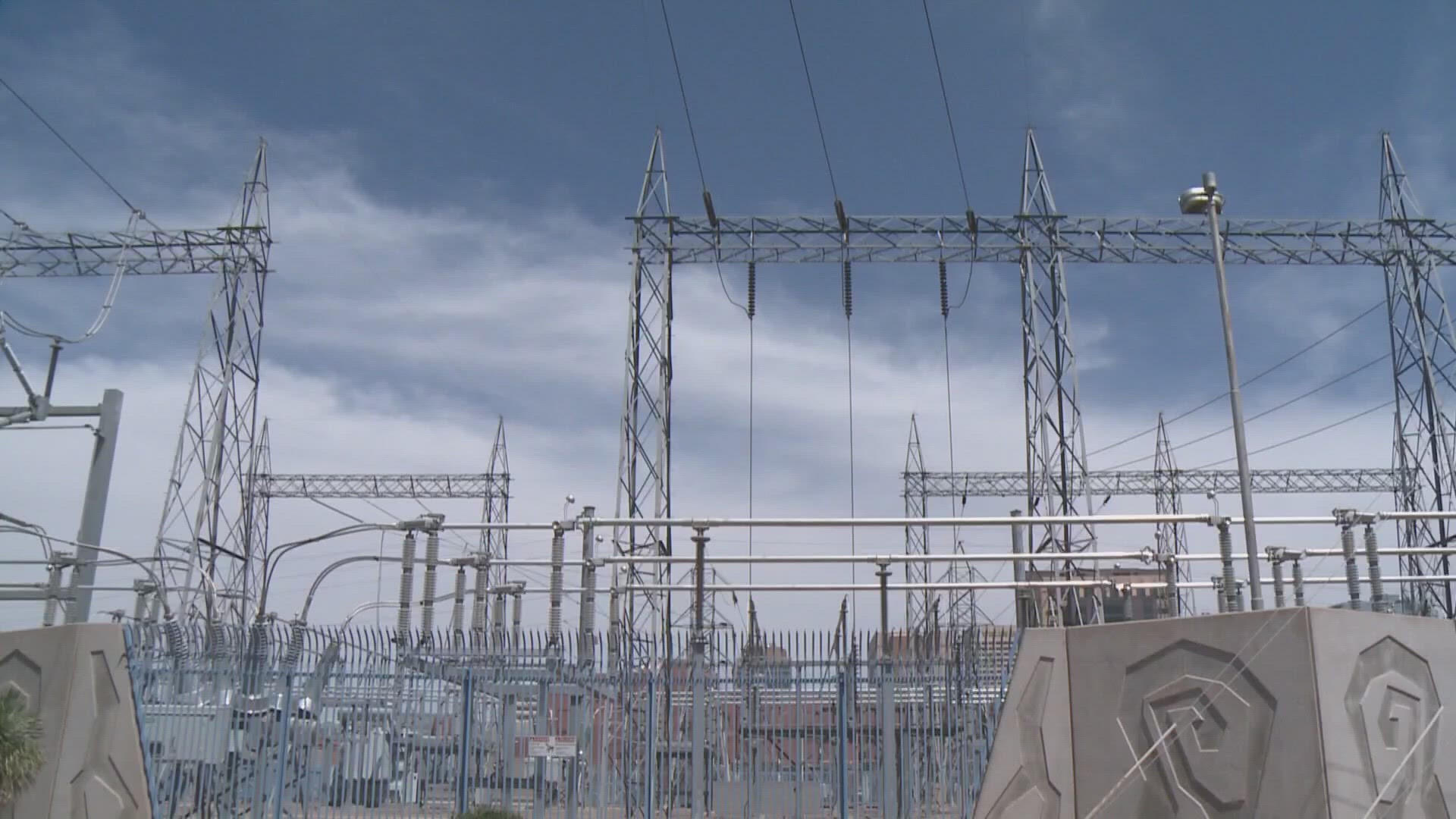ARIZONA, USA — Wildfires, heat waves and the threat of sabotage to the grid will keep utility providers on high alert this summer.
During a recent energy reliability summit, the Valley’s two utilities – APS and SRP – told Arizona Corporation Commissioners they’ve hardened electrical systems, conducted preventative maintenance and stocked up on equipment and parts needed during emergencies.
“We’re ready for this summer. No doubt about it,” said Justin Joiner, vice president of Resource Management for APS.
Climate change is fueling extreme weather
But utility companies can only do so much.
Experts addressing the commission warned climate change is causing unforeseen events that exceed historical norms, posing unique challenges.
They point to the month of August 2020, when temperatures in western states were 15-30 degrees above normal, prompting rolling blackouts in California.
They noted a sharp increase in the number of “Energy Emergency Alert Events” (EEAE) declared in western states, with 34 last year alone.
Faster, hotter wildfires also threaten grid infrastructure and place a strain on communities. New Mexico, Oregon, Idaho and California were hit especially hard by massive wildfires last year.
“These types of extreme weather events are forcing us to rethink how we operate the grid,” said Branden Suddeth of the Western Electricity Coordinating Council.
Uptick in cyber threats and physical attacks
If mother nature wasn’t enough to contend with, foreign and domestic attacks on electricity grids are increasing.
Last year a shooter damaged substations in North Carolina, cutting off power to customers. Shooters also targeted substations in Oregon and Washington.
Cyberattacks against large power systems are also up in the US, Suddeth said.
“With threat actors getting more and more sophisticated, geopolitical tensions that we’re seeing because of the war in Ukraine and our relationship with China, there’s really been a hyper-focus on cybersecurity,” Suddeth said.
APS told the commission the utility participates in third-party audits involving cybersecurity.
“We’re constantly doing drills, tests, and phishing campaigns,” said Joiner of APS.
More Energy Will Be Needed For the Future
New, complex variables present challenges for utilities within the next two to three years.
Presenting a “Resource Adequacy Overview,” Suddeth said growing uncertainty in Arizona is due to a combination of extreme weather and increasing energy demands. People and energy-intensive businesses like data centers arriving in Arizona will require more energy and water in the future.
Weather-reliant energy resources also lead to less predictability, Suddeth said.
“They are changing the shape of the load going forward which is creating more uncertainty around what we are expecting to see in the future,” Suddeth said.
No one discusses how to mitigate climate change
During the four-hour public meeting, Commissioner Lea Marquez Peterson said she wants to explore the possibility of building small modular nuclear reactors. Commissioner Kevin Thompson also expressed the urgent need to explore new infrastructure.
“It’s time we really start looking at how the resource adequacy in Arizona is going to meet the increasing demands into the future, with that future being less than three years away,” Thompson said.
No one discussed the urgent need to address climate change, the existential threat looming over humanity that is intricately linked to the fossil fuel industry.
According to scientists representing 195 countries, immediate and deep emissions reductions “across all sectors” are needed during this decade to curb the devastating effects of global warming.
“To me what was striking about the presentation was that everybody wanted to talk about the symptoms of climate change and no one wants to talk about the cause,” said Autumn Johnson of the Arizona Solar Energy Industries Association (ARISEIA), a trade association that represents solar, storage and electrification technologies. “All of their solutions for how to meet grid resilience and reliability were to continue doing the same things that are causing the problems.”
The commission, currently made up of four Republicans and one Democrat, has proven to act favorably to APS’s financial interests. It voted earlier this year to delay the implementation of an APS home energy program that solar advocates said is long overdue. Commission Utility Director Elijah Abinah sided with APS and opposed the findings of a third-party consultant hired by the commission to evaluate the cost-efficiency of the program.
The commission also voted to give APS full control over whether to allow “competitive community solar” programs in its service territory. The concept is touted by the U.S. Department of Energy as an effective tool to create more solar storage options to the overall grid and save consumers money when applied under the right conditions. APS won’t allow the program at all, a decision that prevents new solar energy developers from doing business in its territory.
Long-time consumer activist Stacey Champion criticized participants of the meeting who, instead of discussing ways to expand sustainable energy resources, spoke enthusiastically about building new natural gas infrastructure. Natural gas releases methane into the atmosphere, a strong greenhouse gas.
“Having attended these workshops in years past, I have real concerns that the majority of our current Corporation Commission is capture by our monopoly utilities and shareholders and not looking out for average Arizonans,” Champion said.
“We are in an unprecedented situation”
Grant Smedley, director of Resource Planning and Acquisitions for SRP said while the utility believes in “a mix of resources,” the increase in demand for energy in Arizona poses a challenge.
“I would say we are in an unprecedented situation here in Arizona. While many utilities across the nation are decarbonizing their portfolios, few if any are having to do that while experiencing such growth,” Smedley said.
2,000 megawatts of solar energy are on schedule to be online in 2025 at SRP, Smedley said.
Up to Speed
Catch up on the latest news and stories on the 12News YouTube channel. Subscribe today.

